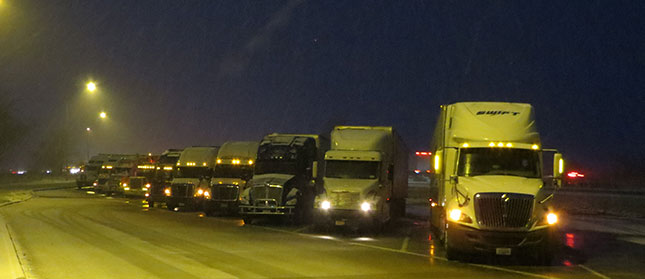
Despite the difficulty in finding truck parking – especially in the wake of mandatory Electronic Logging Devices (ELDs) – there is room for optimism, according to experts.
“Let me be an optimist for a minute,” Dan Murray, vice president at the American Transportation Research Institute, part of the American Trucking Associations, is quoted by Fleet Owner. “We’re about to undertake the second Jason’s Law truck parking study. It should be kicking off in late 2018. I think that could be the impetus for moving to that next stage of truck parking capacity development. When that report is complete, it’s going to be really hard to dispute that there is a need for more capacity and for more parking information. I think that’s going to be an eye-opener for some and a motivator for others to leap to that next phase of capacity development and more information systems.”
Murray, who is on the Department of Transportation’s National Coalition on Truck Parking, adds that the challenge is to find vacant areas where truck drivers can park while they’re on the road and are edging up against HOS constraints. In his opinion, it doesn’t take much money or effort to change empty or underused areas into truck parking in rural areas but that truckers need parking in congested, populated regions.
“We’re highly constrained in certain locations such as those on the East Coast, and particularly the Northeast, also Los Angeles. There’s no question that its catastrophic in some locations. It doesn’t take much more than a brownfield, a bathroom, some garbage containers, and some either permanent or temporary lighting to turn it into an adequate truck parking facility.”
He notes: “I say adequate because that may not be ideal in terms of all the amenities desired but it’s plenty adequate and far, far less expensive than a formal public rest stop would be. That’s low-hanging fruit in just about everybody’s mind.” He warns, though: “You cannot look at brownfields that are 15 miles off the interstate.”
One company is moving in the direction of urban parking. Scott Grenerth, a consultant at Truck Specialized Parking Services (TSPS), said that one of the company’s founders has several empty lots in the Detroit area which have been turned into basic truck parking lots. The current total capacity for locations in Detroit is about 950 to 1,500 depending on percentages of usage (bobtail, dropped trailers, tractor trailers).
“We are not a truck stop operator in the sense of, like a TA Petro, Pilot, Flying J, or a Love’s,” said Grenerth, who is also a member of the National Truck Parking Coalition. “Our priority is security. We’ve got a fence around the property, a seven-foot high fence, plus razor wire, and it’s electric, and there’s one way in and one way out. It’s in the heart of the Detroit industrial area. We have a basic driver lounge with leather couches, good quality Wi-Fi, showers, washers, dryers, and some vending machines.”
There is no other food available but drivers are permitted to drop their trailers and bobtail out to eat or do errands. He emphasizes that the area is strictly controlled, and no one can just wander in like at public truck stops.
Will this model be expanded to other areas? “We want to be where the demand is,” said Grenerth. “We know that in other major market areas there are places where there’s land available, and a major part of our goal is to find these underutilized assets.”
